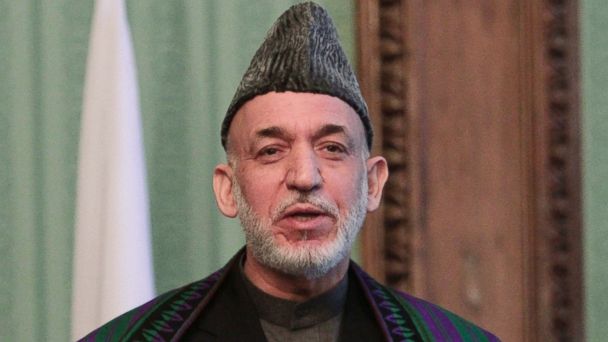Hamid Karzai's Refusal to Sign Security Deal Called 'Reckless'
On "This Week" Sunday, former Obama National Security Adviser Tom Donilon called Afghanistan President Hamid Karzai's refusal to sign a long-term security agreement with the U.S. "reckless."
"President Karzai should go ahead and sign the agreement. It has been approved by a very large assembly of leaders in Afghanistan," Donilon told George Stephanopoulos on "This Week."
"His refusal to sign it at this point is reckless," Donilon added. "Reckless in terms of Afghanistan and I think it adversely impacts our ability to plan coherently and comprehensively… At some point it becomes impossible to make those kinds of plans."
The agreement would maintain a U.S. troop presence in the country after the initial December 2014 deadline for withdrawal, enabling U.S. military personnel to continue to train and assist Afghan national security forces.
Despite heavy-hitting diplomacy from National Security Adviser Susan Rice who visited Kabul last week, Karzai has refused to sign the agreement, drawing criticism from both the U.S. and fellow Afghans lawmakers who support the deal. Tensions escalated this week after a drone strike reportedly killed a group of civilians, including a young Afghan boy, drawing a rebuke from Karzai who has called for the end of U.S. drone strikes in the country.
If Karzai does not sign the security agreement promptly, Donilon said he was confident the U.S would carry out a total troop withdrawal from Afghanistan, termed the "zero option."
"Yes, if the United States does not have a bilateral security arrangement with Afghanistan that supports its troops presence there and provides the kind of guidance and protection we need, the United States cannot be present in Afghanistan after Dec. 31, 2014," Donilon said.

Rahmat Gul/AP Photo
Fallout Over Iran Deal
Donilon dismissed criticism of the nuclear deal with Iran, applauding the Obama administration's "isolation and pressure campaign" against the country, saying the tough approach enabled the new ongoing negotiations regarding the country's nuclear program.
"Absent the United States' lead sanctions, which have been the toughest put on any country, you wouldn't have a negotiation underway right now. You would not have forced the choice," Donilon said.
A six-month deal between world leaders and Iran struck last week calls for temporary sanction relief for Iran in exchange for the country ending any uranium enrichment above five percent, diluting its most highly enriched uranium, and permitting more inspections of its nuclear facilities going forward. The question of Iran's right to enrich uranium in the future remains uncertain.
In interviews this week following the announcement of the deal, Iranian President Hassan Rouhani said he is determined to maintain Iran's ability to enrich uranium, and that the country is not willing to dismantle its nuclear facilities. Rouhani, who was elected this summer, is still seen to be more moderate than his predecessors on the nuclear issue.
"There is a direct line here between the sanctions, Rouhani's elections and them coming to the table," Donilon said on "This Week." "Why? Because we put tremendous pressure on the Iranian economy and we also isolated the Iranians politically."
Tensions with China
And as tensions rise sky-high off the coast of China, Donilon called on the U.S. to increase its diplomatic efforts in the region.
"Asia is a principle opportunity for the United States and the world going forward," he said.
Last week, China announced a new air defense zone and said that any aircraft wanting to fly through it need their permission first. Japan, which also claims ownership over the two islands in the zone, has said it will not follow China's demands, and the U.S., Japan, and South Korea continued to fly planes into the space last week.
When asked why the U.S. should care about uninhabited islands, Donilon said any actions that raise tensions in the region are significant. He credited U.S. presence in the region with preventing escalating hostility.
"In this current incident, if the United States were not present, if the United States didn't take the action it is taking in terms of consulting and coordinating with our allies… you could see tension rising to a really dangerous level," Donilon said.
Vice President Biden departs today for a week-long trip to China, Japan and South Korea and is expected to reiterate the U.S. opposition to the new defense zone.